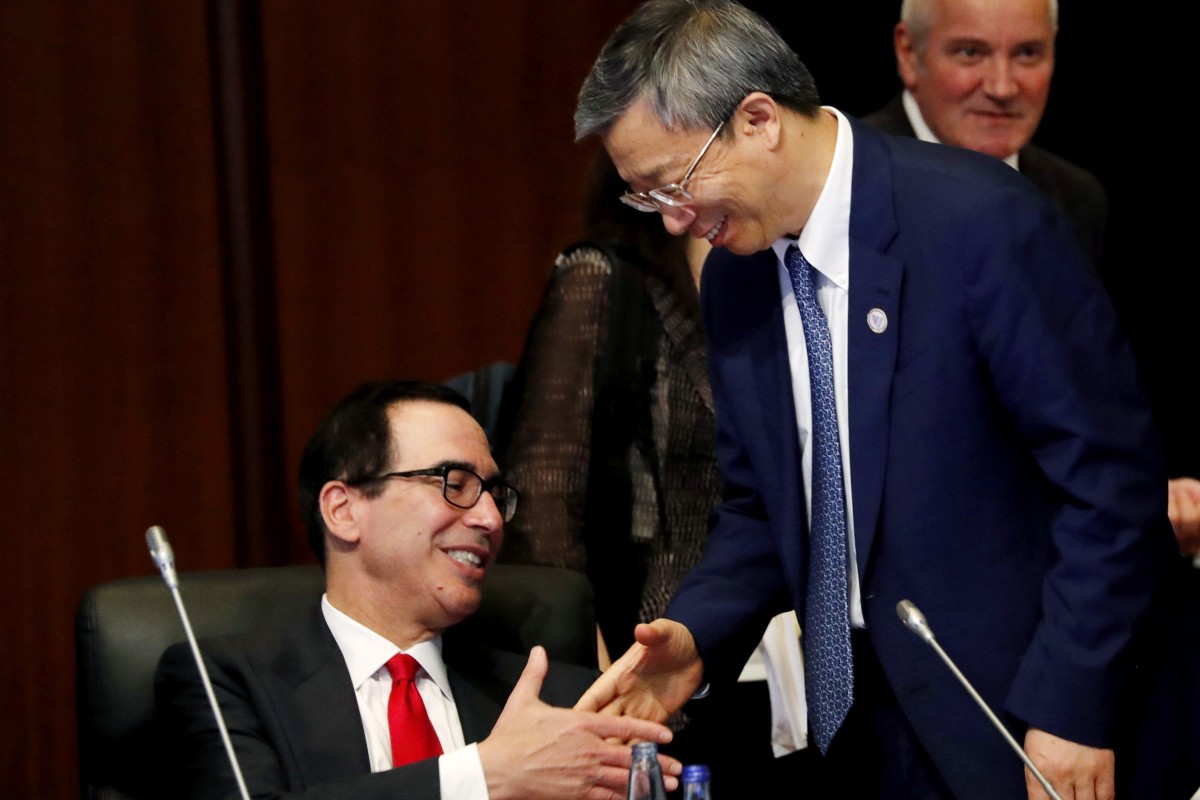Karen Yeung

US Treasury Secretary Steven Mnuchin with People‘s Bank of China governor Yi Gang.
US President Donald Trump has no qualms about introducing more tariffs on Chinese imports if no progress is made on the stalled negotiations when he meets Chinese dictator Xi Jinping later this month, US Treasury Secretary Steven Mnuchin said on Sunday.
Speaking to CNBC at the end of the G20 Finance Ministers and Central Bank Governors Meeting in Fukuoka, Japan, the official suggested the ball was now firmly back in Beijing’s court.
“If China wants to move forward with the deal, we’re prepared to move forward on the terms we’ve done,” he said.
“If China does not want to move forward, then President Trump is perfectly happy to move forward with tariffs to rebalance the relationship.”
Mnuchin said earlier on Twitter that he had had a “candid” discussion about trade with China’s central bank governor Yi Gang on the sidelines of the finance summit.
That was the first face-to-face meeting of senior officials from the US and China since trade negotiations faltered last month.
“Had constructive meeting with PBOC [People’s Bank of China] Governor Yi Gang, during which we had a candid discussion on trade issues,” he said in a tweet alongside a photograph of the two men shaking hands.
“Had constructive meeting with PBOC [People’s Bank of China] Governor Yi Gang, during which we had a candid discussion on trade issues,” he said in a tweet alongside a photograph of the two men shaking hands.
The PBOC later published a short notice on its website saying the two officials exchanged views on global financial conditions, G20 affairs and topics of mutual concern.
Mnuchin said on Saturday that his meeting with Yi would cover only routine trade issues unrelated to the stalled negotiations.
Mnuchin said on Saturday that his meeting with Yi would cover only routine trade issues unrelated to the stalled negotiations.
The “next important meeting” on that matter would not happen until President Trump and Xi met at the G20 leaders summit in Osaka on June 28-29, he said.
Also on Saturday, the Treasury Secretary, who together with US trade representative Robert Lighthizer has led the US side in its trade war negotiations with China, said an agreement to resolve the dispute was 90 per cent complete and that the “US is prepared to negotiate to reach a historic deal”.
If China wanted to resume the negotiations from where the two sides had left off in early May, the US was ready to engage, he said on Saturday.
In the CNBC interview, Mnuchin said he had discussed with Yi the Trump-Xi meeting, but would not be drawn on any potential outcome of the Osaka summit.
“President Trump is going to need to make sure he’s clear that we’re moving in the right direction to a deal,” Mnuchin said.
Also on Saturday, the Treasury Secretary, who together with US trade representative Robert Lighthizer has led the US side in its trade war negotiations with China, said an agreement to resolve the dispute was 90 per cent complete and that the “US is prepared to negotiate to reach a historic deal”.
If China wanted to resume the negotiations from where the two sides had left off in early May, the US was ready to engage, he said on Saturday.
In the CNBC interview, Mnuchin said he had discussed with Yi the Trump-Xi meeting, but would not be drawn on any potential outcome of the Osaka summit.
“President Trump is going to need to make sure he’s clear that we’re moving in the right direction to a deal,” Mnuchin said.
“The president will make a decision after the meeting.
“What I would say is we look forward to them meeting, they had a very productive discussion in Buenos Aires – that’s what led to these rounds of negotiation.”
On the subject of Huawei’s blacklisting, Mnuchin said it was a national security issue.
“Now, of course, President Trump, when he has the meeting, to the extent he gets certain comfort on Huawei or other issues, obviously we can talk about national security issues, but these are separate issues, they’re not being linked to trade,” he said.
“What I would say is we look forward to them meeting, they had a very productive discussion in Buenos Aires – that’s what led to these rounds of negotiation.”
On the subject of Huawei’s blacklisting, Mnuchin said it was a national security issue.
“Now, of course, President Trump, when he has the meeting, to the extent he gets certain comfort on Huawei or other issues, obviously we can talk about national security issues, but these are separate issues, they’re not being linked to trade,” he said.
Aucun commentaire:
Enregistrer un commentaire